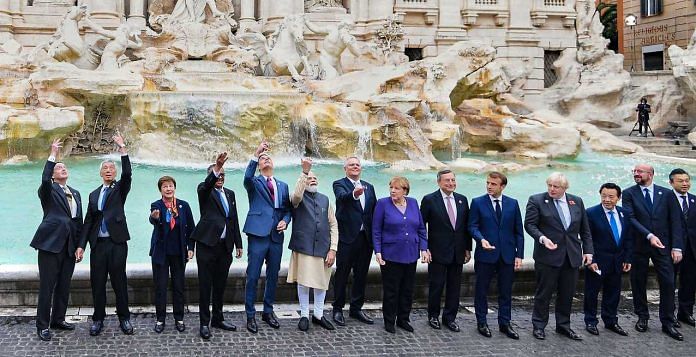The recent rains in cities such as New Delhi, Mumbai, and in the states of Karnataka, Himachal Pradesh and Uttarakhand caused heavy flooding, throwing lives out of gear. Even as such hardships are becoming a regular feature, they capture newspaper headlines and television debates only for a few days, where the underlying challenges of climate change, human greed, improper urban planning, pollution, and the scant regard for sustainable values are given the customary lip service.
More importantly, the blame is usually laid at the feet of the government or the invisible ‘system’ with hardly any mention of the individuals and their responsibilities. A personalised sense of being a part of the solution and owning up to doing one’s bit began with Prime Minister Narendra Modi starting the discussion on Lifestyle for the Environment (LiFE) mission. What is needed now is a wider structure and a concrete strategy to bring about a paradigm shift based on this LiFE concept.
This shift should lead to the emergence of a new economic model, the ‘for-benefits LiFE economy’, which is practical in nature and creates public good, ensuring reasonable private gains for all stakeholders in the ecosystem and at mitigable costs to the planet.
Also read: Modi govt right to take diplomacy beyond Delhi—People’s G20 with selfies, Naga festival
For-benefit model
While the Covid-19 pandemic tested public systems, governments around the world focused mainly on two major issues: containing the health crisis and initiating economic recovery. Typical discourses were around providing bailouts, fiscal stimulus, enhancing social protection, and re-looking at taxation policies apart from providing vaccines and health care.
While these measures were essential, the need to reassess the classical and neoliberal economic models of growth was increasingly evident. In essence, these models thrive on consumption, where the paradigm of markets holds dominance. Experiences around the world show how this poorly regulated consumption-driven market economy has taken away everything that is sustainable. There is little space for concepts like community, solidarity, equity, fairness, and justice. All participants in the economy operate on the principle of “profit maximisation”.
It is this call for LiFE that opened up the discussion on the current model and how the needs of the planet and its living creatures are addressed. There is a dire need now to explore an alternative economic model of growth, a new order that operates on creating surplus value and more importantly, sharing the benefits that accrue among all stakeholders.
Drawing lessons from the current scenario, the new narrative needs a LiFE shift from a ‘for-profit’ mindset to that of a ‘for-benefit’ one. One must build a new framework that actively combines the inherent public service ethos of the government sector, the operational effectiveness of the corporate sector, and the unwavering dedication and passion of the civil society sector. One must redirect the focus from mere revenue generation towards ensuring the benefits for all stakeholders. A movement away from “profit maximisation” to “benefit optimisation” is a must for building a sustainable world economic order. In its essence, the concept of a LiFE economy refers to an economic system that values and prioritises the well-being and flourishing of all life on Earth, rather than just economic growth and material prosperity. It implies mindful and responsible utilisation instead of mindless and destructive consumption.
Creating and building on this new model is not an easy task; one needs to create a new narrative, new definition, new language, and a new understanding. We need to build awareness of what the benefits are and for whom and why.
Also read: India’s G20 presidency made it more inclusive forum
Ideal moment for India
We require policies and a toolkit to effectively operationalise the LiFE economy, as well as institutions that can offer training and necessary support to these emerging entities. There is a need to establish agencies that actively monitor and evaluate the benefits. Undoubtedly, this endeavour requires substantial effort, but it is the ideal moment in India for all stakeholders in the economy, including governments, civil society organisations (CSO), and industry heads to come together. There are many common and differentiated responsibilities that each sector must own and undertake in the true spirit of partnership for this to succeed.
Industry captains need to ask themselves difficult questions and show the courage to move beyond shareholder pressures and their own personal interest of generating profits at any cost. Corporate companies need to consciously focus on being socially and environmentally responsible in its true spirit and not limit it to mere compliance of environmental, social and governance (ESG) guidelines.
When leaders of nations driving 85 per cent of the global economy come together for the G20 summit, it presents an opportunity for them to explore the emergence of this new order. It is for these leaders to not just shift the narrative of economic growth but the entire paradigm of human development itself.
For a world that seems to be rapidly absorbing, accelerating, and celebrating the spirit of market economics and individual attainment, adopting a ‘for-benefits’ LiFE model will seem difficult. However, our civilisational past holds several secrets that can unlock a sustainable future. This could be India’s moment as we fashion a LiFE economy from which the world can learn from. Embedded in this paradigm of a harmonious social economy is a consideration for the well-being of the planet, and its people, and fair gains for everyone. Making this happen is the only way of ensuring that life and living sustainably on this planet becomes a reality sooner than later.
Dr. R Balasubramaniam (Balu) is a development scholar, public policy advocate and the Member-HR in the Capacity Building Commission. Views expressed are personal.
(Edited Ratan Priya)



